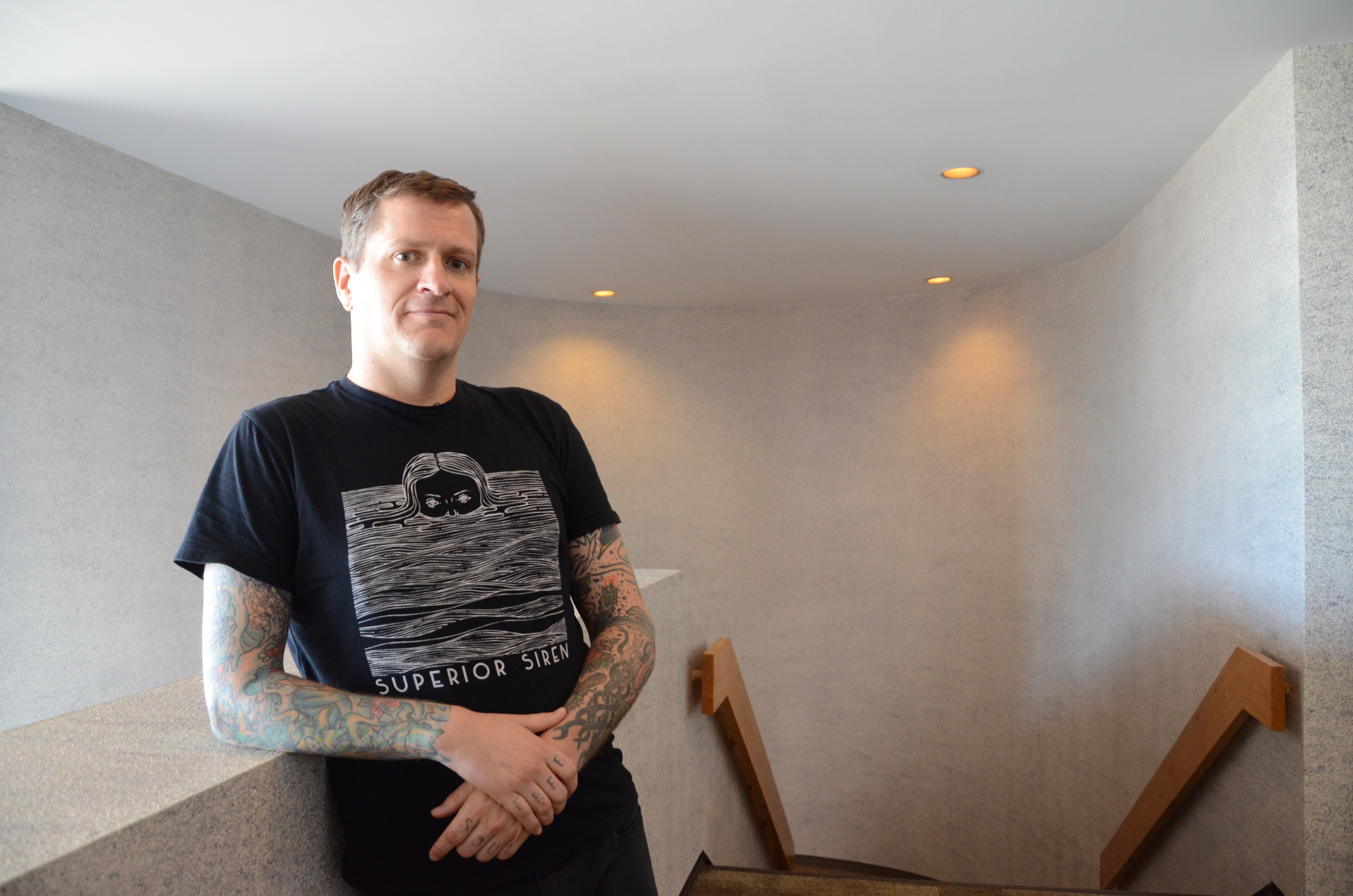
When Denver comedian Ben Roy was seven years old, his parents signed him and his brother up for a summer camp run by the Catholic Diocese of Manchester.
Ben was supposed to stay at Camp Fatima, an all-boys camp in central New Hampshire, for a month.
But after two weeks, he begged his parents to take him home.
At the time, he didn’t completely understand why he wanted to leave. Today, Ben knows the reason: He says he was sexually abused by a camp counselor.
It wasn’t until a few years after he left, when Ben was 10, that he realized his experience at Camp Fatima was not normal. At dinner one night, Ben jokingly blurted out a piece of what he said happened to him. His parents immediately responded with concern, but he downplayed his statement based on their reaction.
“We all just looked at each other and then turned to him and said, ‘What are you talking about?’” Roy’s dad, Bob Roy, said. “And Ben’s reaction was, ‘Oh I’m just kidding.’ And we said, ‘Well Ben, if anything happened that we should know about then you should tell us.’ And he went, ‘No, no, I was just kidding.’ And we kind of left it at that.”
Ben said his family’s shocked reaction set him on his heels and had him backpedaling. The topic was not brought up again in front of him. All conversations from then on were behind closed doors between Ben’s mother and father.
And eventually, his parents decided to let the situation go.
”It came out of my mouth in a very clumsy and distorted manner,” Ben said. “You know, it came out as a joke and I backtracked. And they had to look at, what level of weight do we put to this and in weighing that out they looked at their feelings on the Church.”
Ben’s family was very religious during his childhood — his parents were both devout Catholics, Ben and his brother were both baptized and one of his uncles was a Jesuit priest. His dad said the Church played such a large role in their family, it was difficult to think it could do anything wrong.
“[We thought] if you can trust anybody at all with regard to safety and security, it’s the Church,” Bob Roy said. “A lot of the publicity that has come out in the last 20 years or so was just coming out at the time, and we didn’t have any context, we didn’t have any evidence or information that would suggest that we needed to worry about this.”

Confronting His Monsters, Inside And Out
Over the years, Ben became addicted to alcohol and drugs. He spent some time in jail and was in and out of hospitals for alcohol poisoning.
Ben got sober around the age of 25, but it wasn’t until 2014 that Camp Fatima ever crossed his mind again.
“My wife and I were watching a show about the Vatican and I got in my head, you know I’ve never Googled the camp,” he said. “So I Googled it, and all these articles about 2002 had come up and the scandal and Karl Dowd, the priest who ran it.”
In 2002, a class action lawsuit was filed by six men who alleged staffers at Camp Fatima sexually abused them in the 1970s. One of the accused included Rev. Karl Dowd, who directed the camp from 1968 to 1990. Dowd died in 2002, a few months before the lawsuit was filed. According to the victims’ attorney Peter Hutchins, all cases were settled with the Manchester Diocese.
After reading the stories that sounded remarkably similar to his own, Ben started to dig further. His brother had a yearbook from their time at camp, and one face stood out to Ben. So he searched for the man on Facebook.
“I pulled up people with that name and I messaged about eight or nine of them with a blanket message, ‘Hey were you a counselor at Camp Fatima in the ‘80s?’” Ben said.
Months went by with no response. But then one day, a man wrote back to Ben, saying he was a counselor at Camp Fatima in 1986 and asked Roy if he was in Cabin 1.
“I said, ‘Yeah I was in cabin number one,’” he said. “And then he was like, ‘Because I remember a Ben that was supposed to be there for a month.’”
Ben said he continued corresponding with the man for awhile, trying to ascertain if this could be his abuser. After speaking to a lawyer, Ben decided not to pursue a civil case because the statute of limitations had run out, and he decided not to pursue criminal charges because of the long, legal battle that awaited him.
Instead, he decided to confront the man on his own.
“I picked up the phone and I was ready to read him the riot act and when he answered the phone, you know, your monsters never sound like you think they’re going to sound, they sound like people. And I think that’s the worst thing I could have done,” Ben said.
Ben had discussed his experience at Camp Fatima on several occasions with a therapist. But he said none of those sessions prepared him for what came next: He felt bad for his abuser.
“No one told me, you know, when you confront somebody to be prepared to feel bad for them, to feel guilt,” he said.
The man profusely denied Ben’s allegations. He still works for Camp Fatima, according to Ben, and the Manchester Diocese confirmed to CPR that at least three people from the ‘70s and ‘80s — when allegations against the camp were at their peak — are still employed there.
But the diocese maintains that the camp adheres to policies it’s put in place to protect children, like requiring background checks for all staffers. The Manchester Diocese provided this statement to CPR:
“Whenever Camp Fatima becomes aware of an allegation of sexual abuse of a minor at the camp, it reports the matter to the civil authorities, regardless of when the abuse took place. Camp Fatima policy prohibits anyone who has been found to have abused a minor from working or volunteering at the camp. We encourage anyone who is aware of abuse at the camps to immediately report it to law enforcement and to Camp Fatima, so that we can take any necessary steps to protect children and youth at our camp. While we cannot speak to allegations that have not been reported to us or investigated by the authorities, we strongly encourage the person who reported to you that he was abused to report the matter to law enforcement and to Camp Fatima. We would also like to extend to this person the services of the Diocese of Manchester’s Office for Healing and Pastoral Care, which was established to assist persons who seek healing as survivors of abuse by helping to establish and maintain effective relationships with counseling professionals and persons who can provide pastoral care and to serve as a source of comfort and support.” |
Roy called the statement “typical, canned, legal jargon.”
“The last thing that I want to do is go to any kind of therapy services that are being provided by the same group of people who victimized me,” he said.

Advice, Father To Son, And Parent To Parents
Ben’s father admits that if he could go back, he would have done things differently.
“If you hear something like that from your child you need to question ... You need to not assume that just because the Church is involved in this, that there isn’t the possibility that something wrong is going on,” Bob Roy said.
He and his son both emphasize the importance of parents asking questions, even when a child tries to brush the situation off as a joke.
“Now we know that’s how kids broach subjects, they joke about it, they test the waters,” Ben said. “You have to hear what they’re saying now and dig and pull … A lot of [my] damage came from feeling like I wasn’t heard or protected.”
In a recent Tweet, Roy said the perception that children do not speak up about abuse is false.
I'm still shocked that people believe children did not come forward and alert their parents of abuse by clergy. True, some didn't. But a lot did speak up and their parents did nothing. I spoke up. It isn't just children's fears creating this. It's the parent's fear as well.
“The last thing you want to see is your children in pain,” Bob Roy said. “And it’s hard to think that maybe the cause of that pain was something you failed to do.”








